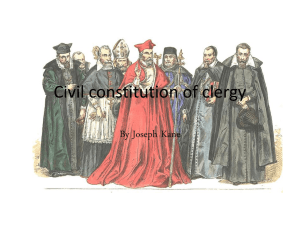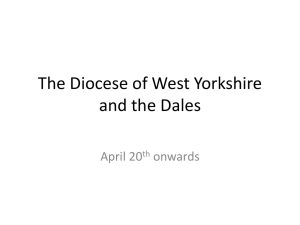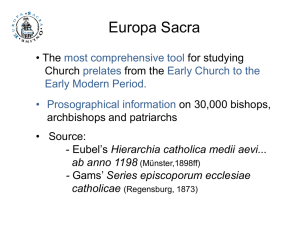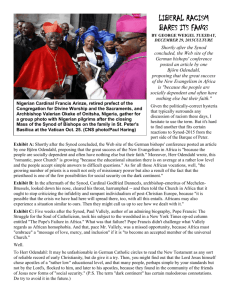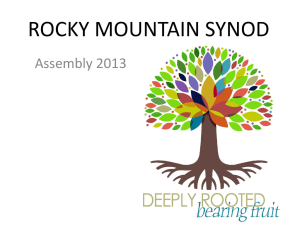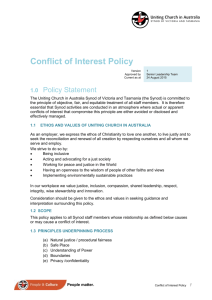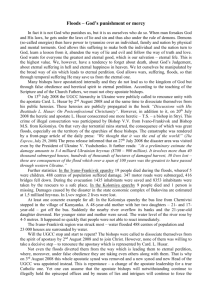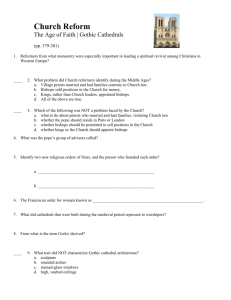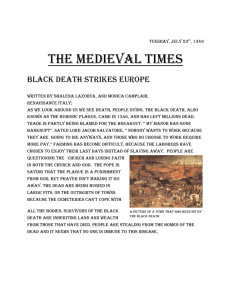1 - Documenta Catholica Omnia
advertisement
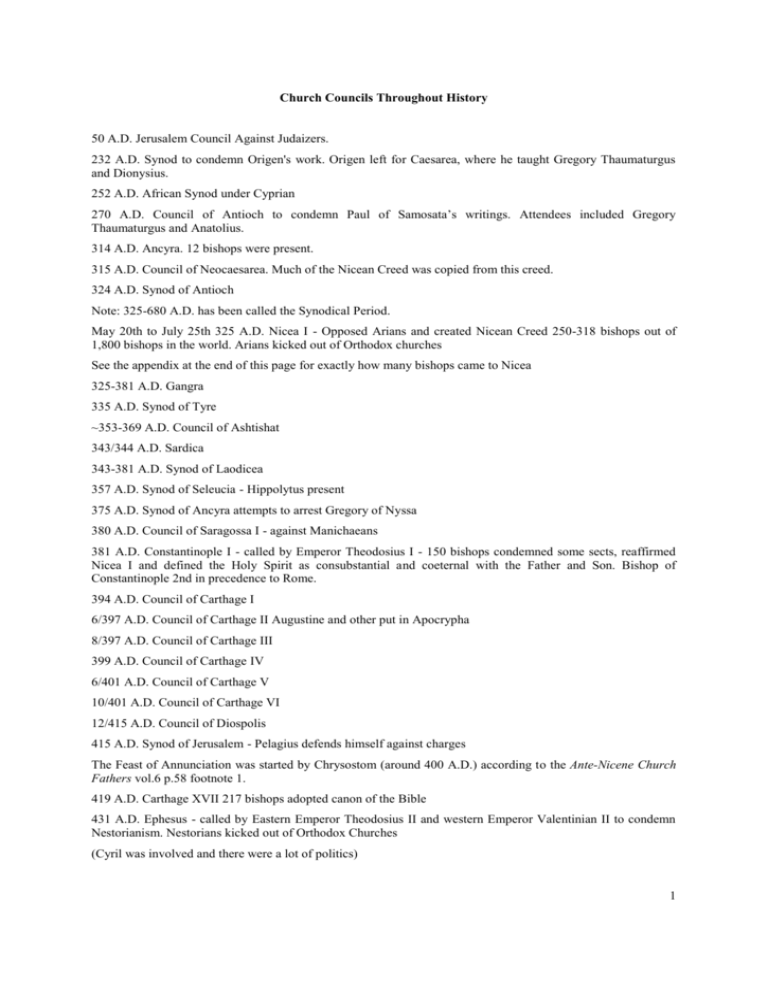
Church Councils Throughout History 50 A.D. Jerusalem Council Against Judaizers. 232 A.D. Synod to condemn Origen's work. Origen left for Caesarea, where he taught Gregory Thaumaturgus and Dionysius. 252 A.D. African Synod under Cyprian 270 A.D. Council of Antioch to condemn Paul of Samosata’s writings. Attendees included Gregory Thaumaturgus and Anatolius. 314 A.D. Ancyra. 12 bishops were present. 315 A.D. Council of Neocaesarea. Much of the Nicean Creed was copied from this creed. 324 A.D. Synod of Antioch Note: 325-680 A.D. has been called the Synodical Period. May 20th to July 25th 325 A.D. Nicea I - Opposed Arians and created Nicean Creed 250-318 bishops out of 1,800 bishops in the world. Arians kicked out of Orthodox churches See the appendix at the end of this page for exactly how many bishops came to Nicea 325-381 A.D. Gangra 335 A.D. Synod of Tyre ~353-369 A.D. Council of Ashtishat 343/344 A.D. Sardica 343-381 A.D. Synod of Laodicea 357 A.D. Synod of Seleucia - Hippolytus present 375 A.D. Synod of Ancyra attempts to arrest Gregory of Nyssa 380 A.D. Council of Saragossa I - against Manichaeans 381 A.D. Constantinople I - called by Emperor Theodosius I - 150 bishops condemned some sects, reaffirmed Nicea I and defined the Holy Spirit as consubstantial and coeternal with the Father and Son. Bishop of Constantinople 2nd in precedence to Rome. 394 A.D. Council of Carthage I 6/397 A.D. Council of Carthage II Augustine and other put in Apocrypha 8/397 A.D. Council of Carthage III 399 A.D. Council of Carthage IV 6/401 A.D. Council of Carthage V 10/401 A.D. Council of Carthage VI 12/415 A.D. Council of Diospolis 415 A.D. Synod of Jerusalem - Pelagius defends himself against charges The Feast of Annunciation was started by Chrysostom (around 400 A.D.) according to the Ante-Nicene Church Fathers vol.6 p.58 footnote 1. 419 A.D. Carthage XVII 217 bishops adopted canon of the Bible 431 A.D. Ephesus - called by Eastern Emperor Theodosius II and western Emperor Valentinian II to condemn Nestorianism. Nestorians kicked out of Orthodox Churches (Cyril was involved and there were a lot of politics) 1 441 A.D. Council of Orange I deposed Cheliderius of Besancon because he married a widow before receiving priestly orders 451 A.D. Chalcedon - 150 bishops - Accepted writings of Theodore of Mopsuestia, Theodoret of Currhus and Ebas of Edessa. Monophysites kicked out of Orthodox Churches 457 A.D. Council of Milan 501 A.D. Council of Rome 505-506 A.D. Synod of Dvin I 506 A.D. Agde - Caesarius of Arles presided 524 A.D. Arles - Caesarius of Arles presided 527 A.D. Carpentras - Caesarius of Arles presided 529 A.D. Synod/Council of Orange II - Caesarius of Arles presided condemned Faustus for being Semi-Pelagian 529 A.D. Vaison - Caesarius of Arles presided 531 A.D. Orleans I 533 A.D. Auvergne 533 A.D. Marseille - Caesarius of Arles presided 538 A.D. Orleans II 541 A.D. Orleans III 541 A.D. Constantinople - repudiated Council of Ephesus 550 A.D. Synod of Dwin II - rejects Council of Chalcedon 553 A.D. Constantinople II - called by Emperor Justinian I, anathematized Theodore of Mopsuestia, Theodoret of Currhus and Ebas of Edessa. 554 A.D. Second Council of Tvin (Dvin II) 560 A.D. Synod at Brefi in Britain (David of Wales participated) 569 A.D. Synod at Caerleon in Britain (David of Wales participated) 589 A.D. Toledo - filioque clause put in to Creed 592 A.D. Concilium Quinisextum or second Trullan council (Orthodox Church) 614 A.D. Council of Paris 649 A.D. Lateran Synod - called by Pope Martin I - 105 bishops 662 A.D. Council of Hereford in Britain 664 A.D. Synod of Whitby, Britain Oswy abandons Celtic church for Roman Catholic church 679 A.D. Council of Hatford in Britain 680 A.D. Constantinople III - called by Emperor Constantine IV. condemned monothelitism 680 A.D. was the last general council, because this was the last church council where both the eastern and western bishops were present. 691 A.D. Constantinople IV - called by Emperor Justinian II. legislative code for the church. Western church never accepted this. 692 A.D. Quinisext 742 A.D. Council of Germanicum - banned Easter fires 743 A.D. Council of Lestines - banned Easter fires 747 A.D. Synod of Franconia 2 754 A.D. Constantinople V - called by Emperor Constantine V. Condemned image worship. 787 A.D. - Nicea II condemned Constantinople V and accepted image worship. 794 A.D. Council of Frankfurt of western bishops. This council rejected the 537 A.D. Council according to The Ante-Nicene Fathers vol.6 p.53 824 A.D. Council of Paris - France and the East tried to agree on the devotion to be paid to images. 853 A.D. Council of Quiercy - condemned double predestination - Hincmar of Reims presided 869-870 Constantinople VI called by Emperor Basil I to confirm deposing Photius, Patriarch of Constantinople. 879 A.D. Constantinople VII - called reinstated Patriarch Photius to repudiate council of 869-870. 990 A.D. Synod of Charroux, France 990 A.D. Synod of Narbonne, France 990 A.D. Synod of Puy, France 991 A.D. Council of Limoges, France 998 A.D. Council of Poitiers, France 1003 A.D. Council of Thoinville, Germany 1007 A.D. Council of Frankfurt, Germany 1023 A.D. Council of Seligenstadt, Germany 1025 A.D. Council of Arras I against Manichaeans 1038 A.D. Council of Bourges, France 1050 A.D. Council of Rome I condemned Berengarius of Tours 1050 A.D. Council of Vercelli - condemned Berengarius of Tours 1051 A.D. Council of Paris - condemned Berengarius of Tours 1059 A.D. Council of Rome II condemned Berengarius of Tours 1076 A.D. Synod of Worms 1079 A.D. Council of Rome III condemned Berengarius of Tours 1080 A.D. Council of Burgos - Imposed Roman rite on Spain instead of Visigothic rite 1096 A.D. Council of Clermount - launch first Crusade 1097 A.D. Council of Arras II 10/1/1098 A.D. Council of Bari - East vs. West 4/24/1099 A.D. Easter Synod 1102 A.D. Council of London 1128 A.D. Council of Arras III 1128 A.D. Council of Troyes - Criticized Bernard of Clairvaux 1140/1 A.D. Sens Bernard condemns Abelard 1148 A.D. Cremona - excommunicated Arnold of Brescia 1163 A.D. Synod of Tours 1179 A.D. Council of Hromcla - Nerses of Lambron almost effected union of Greek and Armenian Churches 1179 A.D. 3rd Lateran Council 1184 A.D. Council of Verona - condemned Waldenses and Humiliati 1197 A.D. Council of Berona - Burn Waldenses to death 3 1207 A.D. @Pamiens tried to reconcile Waldenses and Catholics 1215 A.D. 4th Lateran Council 1218 A.D. Council of Bergamo 12 Waldenses said no purgatory or prayers for the dead 1229 A.D. (local) Council of Toulouse after the capitulation of the Albigensians, and forbidding the laity to possess Bibles. 1274 A.D. Lyons 1311 A.D. Vienne 1341 A.D. Constantinople VIII Condemned monk Barlaam for opposing Hesychast sect on Mt. Athos. 1414-1417 Constance - under Martin V -Ended Great Schism of anti-Popes. 2 Popes deposed, 1 abdicated, and 1 new Pope elected. Condemned 45 propositions of Wycliffe and 30 of Hus, who was burned at the stake. 1413 Council of Prague 1431-1449 Basil 1438/9 Council of Florence 1532 Council of Cianforn - most Waldenses accept Reformed teaching ~1545 Council of Trent. Catholic church recognizes the gospel and Condemns it. It met for 19 years in 25 sessions. When it opened there were 15 bishops and 4 others. 1672 Council of Jerusalem. Orthodox church recognizes the gospel and Condemns it. It refutes Cyril Lucar point-by-point. 1829 Council of Baltimore 1833 Council of Baltimore 1837 Council of Baltimore 1840 Council of Baltimore 1843 Council of Baltimore 1846 Council of Baltimore 1849 Council of Baltimore 1869 Vatican I 700 bishops. Some sessions had as few as 100 bishops The first code of Canon Law was published in 1917. 1962-1968 Vatican II 2,900 bishops and 2 prelates 5/1919 Philadelphia World Conference on Christian Fundamentals Q: Exactly How Many Bishops came to the 325 A.D. Council of Nicea? A: Different writers give different numbers for the Council of Nicea (Nicea I) held from May 20, 325 to July 25 325 A.D. 318 Hilary of Poitiers On the Councils ch.86 p.27 318 Epiphanius of Salamis vol.2, p.331-2: book II, Heresy 69, chapter 11 318 Socrates Scholasticus Church History book 4 ch.12 p.102 The Letter of Liberius Bishop of Rome, to the Bishops of the Macedonians 300 Socrates Scholasticus Church History book 1 ch.9 p.14 says Constantine in his letter says 300. about 300 Athanasius 318 Athanasius in his letter Ad Afros 4 270 Eustathius of Antioch >300 Gelasius of Cyzicus >250 Eusebius more than 2000 Arabic manuscripts of Eusebius 318 Creeds of Christendom volume 1 : History of the Creeds by Philip Schaff p.25 We can figure out at least 232-237 names according to http://www.newadvent.org/cathen/11044a.htm Here are various quotes From http://www.piar.hu/councils/ecum01.htm The figure of 318 given in the heading below is from Hilary of Poitier and is the traditional one. Other numbers are Eusebius 250, Eustathius of Antioch 270., Athanasius about 300, Gelasius of Cyzicus at more than 300. Note it is actually not "Poitier" but "Poitiers" From http://www.newadvent.org/cathen/11044a.htm Eusebius speaks of more than 250 bishops, and later Arabic manuscripts raise the figure to 2000 - an evident exaggeration in which, however, it is impossible to discover the approximate total number of bishops, as well as of the priests, deacons, and acolytes, of whom it is said that a great number were also present. St. Athanasius, a member of the council speaks of 300, and in his letter "Ad Afros" he says explicitly 318. This figure is almost universally adopted, and there seems to be no good reason for rejecting it. Most of the bishops present were Greeks; among the Latins we know only Hosius of Cordova, Cecilian of Carthage, Mark of Calabria, Nicasius of Dijon, Donnus of Stridon in Pannonia, and the two Roman priests, Victor and Vincentius, representing the pope. The assembly numbered among its most famous members St. Alexander of Alexandria, Eustathius of Antioch, Macarius of Jerusalem, Eusebius of Nicomedia, Eusebius of Caesarea, and Nicholas of Myra. Some had suffered during the last persecution; others were poorly enough acquainted with Christian theology. Among the members was a young deacon, Athanasius of Alexandria, for whom this Council was to be the prelude to a life of conflict and of glory (see ST. ATHANASIUS). ... All the bishops save five declared themselves ready to subscribe to this formula, convince that it contained the ancient faith of the Apostolic Church. The opponents were soon reduced to two, Theonas of Marmarica and Secundus of Ptolemais, who were exiled and anathematized. Arius and his writings were also branded with anathema, his books were cast into the fire, and he was exiled to Illyria. The lists of the signers have reached us in a mutilated condition, disfigured by faults of the copyists. Nevertheless, these lists may be regarded as authentic. Their study is a problem which has been repeatedly dealt with in modern times, in Germany and England, in the critical editions of H. Gelzer, H. Hilgenfeld, and O. Contz on the one hand, and C. H. Turner on the other. The lists thus constructed give respectively 220 and 218 names. With information derived from one source or another, a list of 232 or 237 fathers known to have been present may be constructed. From http://en.wikipedia.org/wiki/First_Council_of_Nicaea Constantine had invited all 1800 bishops of the Christian church (about 1000 in the east and 800 in the west). The number of participating bishops cannot be accurately stated; Socrates Scholasticus and Epiphanius of Salamis counted 318; Eusebius of Caesarea, only 250. The participating bishops were given free travel to and from their episcopal sees to the council, as well as lodging. These bishops did not travel alone; each one had permission to bring with him two presbyters and three deacons, so the total number of attendees would have been above 1500. Eusebius speaks of an almost innumerable host of accompanying priests, deacons, and acolytes. From http://www.tertullian.org/rpearse/epiphanius.html about Epiphanius Salamis (born 310-320 A.D.) became bishop of Salamis in Cyprus 367 A.D., died on the way home from the Council of the Oak in 402/403 A.D. This excerpt is taken from Vol.2, p.331-2: Book II, Heresy 69, chapter 11. Note that the translator tells us in the preface that he has chosen to render the word 'heresy' as 'sect'. 11, 1 When this was over the emperor felt concerned for the church, because by now many members often differed with one another and there were many schisms. He therefore convened an ecumenical council of 318 5 bishops, whose names are still preserved. And they condemned Arius' creed in the city of Nicaea, and confessed the orthodox and unswerving creed of the fathers, which has been handed down to us from the apostles and prophets. 6
